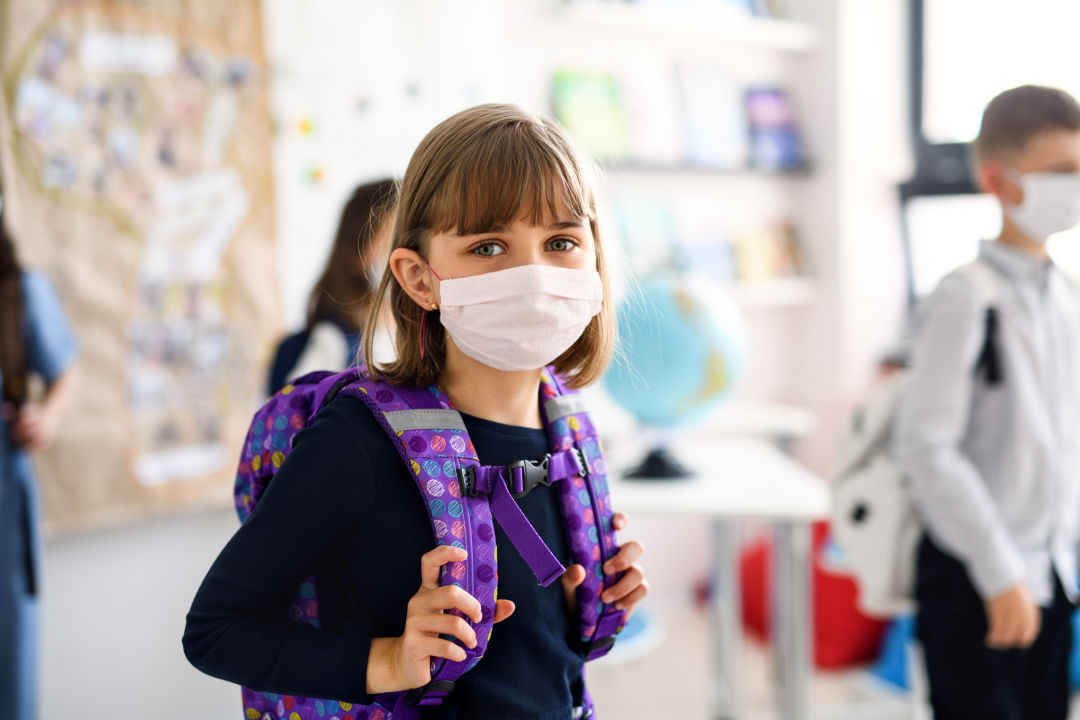Should Kids Still Be Wearing Masks?

Masks were voted optional for Sarasota County Schools in the 2021-2022 school year.
Image: Halfpoint/Shutterstock.com
In a unanimous vote on Tuesday, July 13, the Sarasota County School Board determined that masks will be optional for children in the upcoming school year. While the mask mandate for schools expired on June 30, this latest decision was made to set the policy in stone and reduce confusion among parents. It leaves parents to consider the pros and cons of masking their children, especially if unvaccinated.
While Covid-19 vaccines are approved for ages 12 and older, no vaccination manufacturer has been approved for kids under 12. (However, as of Wednesday, July 7, vaccine manufacturers Pfizer and Moderna were conducting trials in healthy children between the ages of six and 11 years old.) The CDC is also recommending that children two and older who have not been vaccinated remain masked.
In a recent post on its website, Sarasota Memorial Hospital epidemiologist and infectious disease specialist Dr. Manuel Gordillo shared information regarding how parents should navigate this new phase in our community. Here's a summary of that information—the post can be viewed in full here.
Should children continue wearing masks?
"Once fully vaccinated, the CDC says it's safe for kids 12 and up to remove their masks in most settings—just like fully vaccinated adults. Pediatricians recommend that unvaccinated children continue to wear masks around others when indoors and take other precautions to protect themselves and at-risk adults in their lives, especially those who are immunocompromised or over age 65. If everyone in the immediate family and in small gatherings is low-risk, it's safe for kids to enjoy unmasked activities at home and outdoors."
"Children too young to be vaccinated and anyone with immunocompromised conditions are best protected when the adults and vaccine-eligible adolescents around them are vaccinated, as well."
What are the risks of Covid-19 for children who are not vaccinated?
"Currently, about 24 percent of the Covid-19 cases in the United States are in young children, and about 300 have died from the virus since the pandemic began. Although young kids are at much lower risk of having severe Covid-19 infection, Covid-19 has sent more than 16,000 to hospitals [as of May 2021]—that's more children than are hospitalized for flu in an average year, according to the American Academy of Pediatricians. And long-term effects of Covid-19 remain largely unknown."
Have there been any serious complications among vaccinated adolescents?
"Just like other childhood immunizations, the Pfizer-BioNTech Covid-19 vaccine has gone through clinical trials and rigorous scientific review to determine that it's safe for children as young as 12. Beyond the clinical trials, health officials continue to gather information on the more than 3 million adolescents age 12 to 17 who've received at least one dose of the Pfizer shot in the United States."
"While the CDC announced it is looking into reports that a small number of vaccinated teenagers and young adults may have experienced inflammation of the heart muscle [myocarditis], that review is in the early stages, and there is not yet a clear link to the vaccines. The agency has posted guidance on its website advising doctors and clinicians to be alert to unusual heart symptoms among young people who just received their shots."
"Experts emphasize that the potentially rare side effect of myocarditis pales in comparison to the potential risks of Covid-19, including the persistent syndrome called 'long Covid,' which itself can cause myocarditis."
Will the vaccine be available to children younger than 12 this year?
"All three manufacturers of U.S.-authorized vaccines are studying the safety and effectiveness of their vaccines in children as young as six months. Realistically, Covid-19 vaccines could roll out for younger children this fall."
Are Covid-19 vaccine side effects different for kids?
"Fevers are slightly more common in 12- to 15-year-olds compared to adults, most likely due to adolescents' stronger immune response. In general, however, side effects are similar to those seen in adults, and typically last one to three days. The most common side effects reported include discomfort at the injection site, headache, chills, fever and muscle/joint pain."



